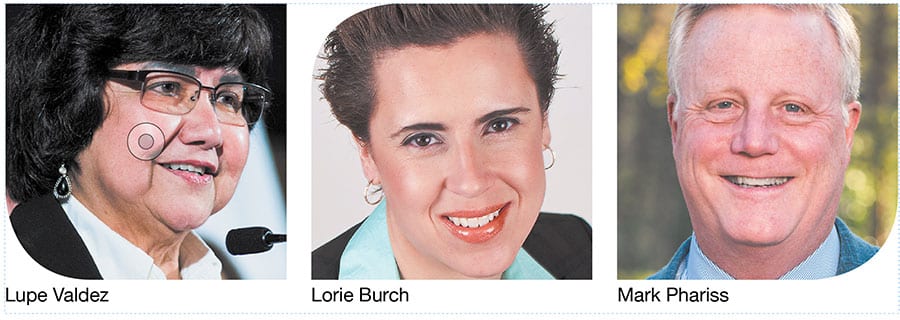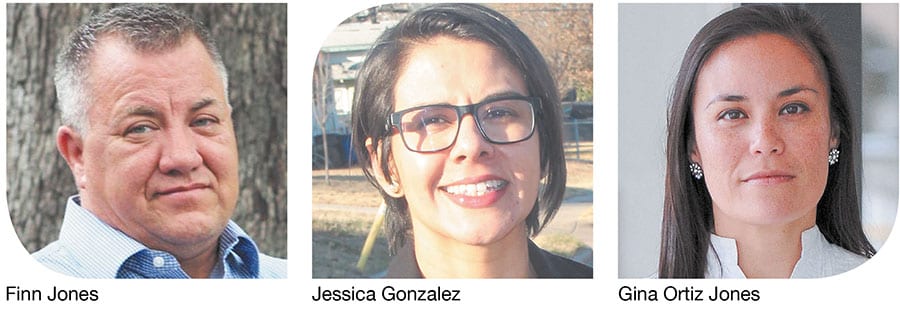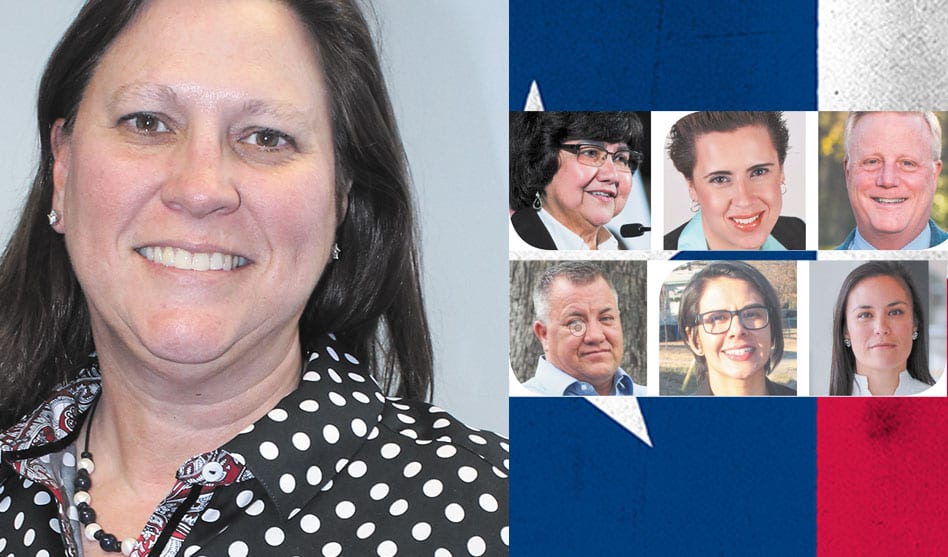Julie Johnson, left
High-profile candidates at the top of the ballot came up short, but LGBT Texans have much to celebrate in the 2018 elections
David Taffet | Senior Staff Writer
taffet@dallasvoice.com
While progressives in Texas, including many in the LGBT community, were hit hard by Beto O’Rourke’s loss to Ted Cruz in the race to represent Texas in the U.S. Senate, the Nov. 6 elections included some huge victories for LGBT and ally candidates. And even in many of those races in which high-profile progressive candidates fell short, there was good news for LGBT Texans.
Winners
When the Texas Legislature convenes next year, there will be five women from the LGBT community in the House of Representatives. Rep. Celia Israel in District 50 and Rep. Mary Gonzales in District 75 were both re-elected, without any general election opposition. They will be joined by new state Reps. Julie Johnson, who claimed a substantial 14-point win over homophobic bathroom bill author Matt Rinaldi, the incumbent, in District 115; Jessica Gonzales, who won the District 104 primary and had no general election opponent, and Erin Zweiner, who defeated Republican Ken Strange by 4 points for the open seat in District 45.
Gina Ortiz Jones, running in U.S. House District 23, still has a chance to become the first lesbian elected to Congress from Texas. At press deadline, incumbent Republican Will Hurd led Jones by only 689 votes, with all precincts counted by a number of provisional ballots, absentee ballots and military and overseas ballots still left to be tallied. And with less than 1 percentage point separating the two, Jones’ campaign was already gearing up for a recount.
Jones is responsible for paying the cost of the recount up front, and that cost could be considerable. District 23 stretches 500 miles from San Antonio to El Paso and includes 1,123 precincts. Recount costs are charged per precinct — $60 per precinct using paper ballots and $100 per precinct using electronic ballots. If half the voting locations used paper and the other half used machines, the cost would be about $90,000.
If the recount changes the outcome, the money is returned to the campaign and the counties pay the cost of their error.
Other LGBT candidates that won on Tuesday included: Beau Miller for judge in the 190th Judicial District Court; Charles Spain for justice in the Court of Appeals for the 14th District of Texas; Jason Cox for judge in the Harris County Probate Court; Jerry Simoneaux for Judge in the Harris County Probate Court; Jim Kovach for judge in the Harris County Civil Court at Law, and Shannon Baldwin for judge in the Harris County Criminal Court.

Near misses
While former Dallas County Sheriff Lupe Valdez lost her bid for governor, she pulled in nearly 43 percent of the vote against incumbent Greg Abbott — an astounding feat for an openly lesbian Democrat in a statewide election in Texas.
Abbott had hoped to increase his margin of victory this year over the 20 percent lead he held over Wendy Davis in the 2014 gubernatorial race. Instead, Valdez cut his margin by half, even though she never tried to hide who she is.
“I ran as the first Latina, the first LGBT major party nominee for governor,” she told a crowd in Austin during her concession speech on Tuesday night, during which she gave special thanks “to my incredible, patient and caring partner, Lindsay.
In addition to thanking a number of her campaign workers, Lupe offered “my sincerest gratitude to the late, great Gov. Ann Richards, who helped pave the way for women like me, and those yet to come, to know that occupying the highest office in Texas is well-within our reach.”
Other candidates made similar strong showings: Lorie Burch won 44 percent in her race for the District 3 seat in the U.S. House, while Mark Phariss came within 2 points of winning the District 8 seat in the Texas Senate.
Burch thanked her team for their hard work and suggested she isn’t done with public life. “Our goal was to win and we fell short of that goal,” Burch said, adding that when she called her opponent, Van Taylor, on Wednesday to congratulate him, she told him, “My 44 percent is the part of Collin County that is growing.”
In perhaps the most surprising result of Election Night, openly-transgender man and first-time political candidate Finnigan Jones pulled in 44 percent of the vote in solidly-red Texas House District 94 against Tony Tinderholt, a right-wing “family values” incumbent.
Phariss’ campaign for Texas Senate District 8 may have set several records for a Democrat running in Collin County. “No one’s been this competitive,” Phariss said the day after the election. “I feel very proud.”
Phariss raised more money than any Democrat running in the conservative county north of Dallas and may have earned the most votes any Democrat has gotten in a local race there.
But, he said, what surprised him most throughout his campaign was that “not one person asked me about being LGBT or questioned if I could be a good senator.”
He said his experience on the campaign trail confirmed to him that Texas leaders and members of the Texas Legislature are way out of step with the people of Texas.
As for his future political aspirations, Phariss said, “I’m not going to even think about it. Right now, I have to take down signs and get thank-you letters written and sent.”

The winning strategy
Equality Texas CEO Chuck Smith said discrimination just wasn’t a campaign theme that resonated in this election. Of the 12 House seats that flipped from Democrat to Republican, 11 had been held by anti-LGBT incumbents.
The 12th was Jason Villalba’s seat. Villalba, a North Dallas Republican, lost his District 114 primary to Tea Party candidate Lisa Luby Ryan, who then lost in the general election to Democrat John Turner.
Villalba received among the highest Equality Texas scores of any Republican member of the House.
In the Senate, two notoriously anti-LGBT North Texas Tea Party members — Konnie Burton in District 10 in Fort Worth, and Don Huffines in District 16 in Dallas —
lost their re-election bids to Democrats who will be allies to the LGBT community, Smith said. Those winners were Beverly Powell in District 10 and Nathan Johnson in District 16.
Smith said the formula for the winning campaigns was sticking to the issues that affect people like property tax relief and school funding.
He said Erin Zweiner, who identifies as bi, benefited from the community values of her hometown of Dripping Springs, west of Austin. In 2016, Dripping Springs school officials decided to allow a trans girl use the girl’s restroom. The anti-LGBT group Texas Values became involved, orchestrating a media blitz attacking the child.
But, Smith said, “Parents stepped up, demanding they stop using kids as political pawns,” and protected the trans girl.
When it came to issues, he continued, Zweiner stuck to the same issues Johnson and others did — school finance and property tax relief.
Around the country, Smith said, results proved: “Being for equality was a winning campaign message.”
Smith applauded all the LGBT candidates who ran in primaries, whether or not they made it to general election and whether or not they won and will serve in office.
They are, he said, role models for younger people. For younger LGBT people to see someone like them running for office “continues to elevate the conversation,” he said.
Despite O’Rourke’s disappointing loss, Smith pointed out that Democrats did better than they have done in years in Texas. “The gap was smaller than what we’ve seen in a long time,” he said.
Lt. Gov. Dan Patrick won by only 5 percent this time. In his last election, he won by a 50 percent margin. Attorney General Ken Paxton led by 20 percent in 2014 but only 3 percent this year. And O’Rourke’s 2.5 percent loss to Ted Cruz was much closer than Paul Sadler’s 16-point loss to Cruz in 2012.













